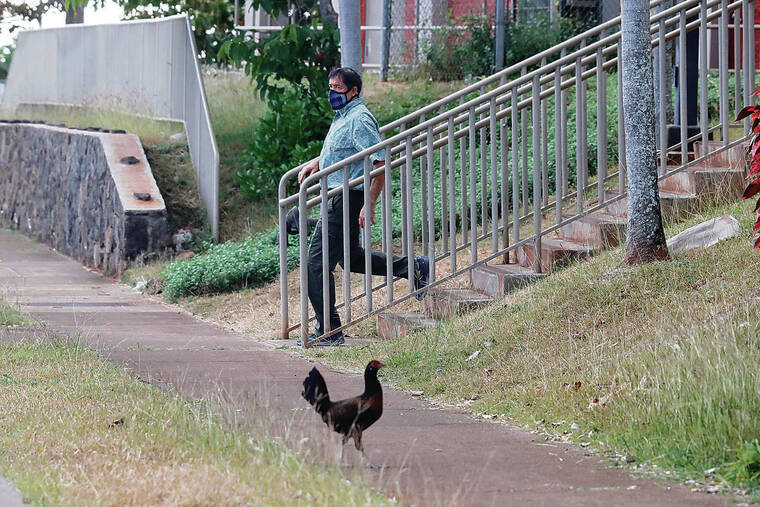A bill to establish a five-year pilot program to combat feral chickens throughout the islands is moving through the Legislature.
Through Senate Bill 2195 Opens in a new tab’s proposed pilot, counties would collaborate to develop affordable and humane ways to significantly reduce the count of feral chickens that have been digging under fences, flying into cars and crowing to the annoyance of neighbors.
“It’s been pretty much a nightmare for the last couple years,” said Andy Kaufman, an Aiea Heights resident who has been short on sleep for weeks due to crowing roosters. “We even bought double-pane windows all over our house because you couldn’t sleep at night.”
Lawmakers are considering using contraceptive feed called OvoControl to manage the growing chicken population. The Hawaiian Humane Society proposed the method in written testimony supporting the bill.
“Basically, OvoControl is a contraceptive that’s mixed into the feed, and it prevents eggs from hardening and hatching into new chicks,” Stephanie Kendrick, public policy advocate for the Hawaiian Humane Society,
told the Honolulu Star-
Advertiser.
The method is already used to help control the pigeon population in Hawaii, Kendrick said, adding that the Humane Society would like residents to have the opportunity to apply for permits to use OvoControl on their properties.
While the Humane Society receives widespread
complaints regarding feral chickens, the nonprofit is not involved with managing that population, Kendrick said.
When asked about chicken contraceptives, Kaufman said, “Anything and everything would help.”
He recalled a six-month span of quiet when the state removed some roosters from his neighborhood about a year and a half ago. “Now it’s just worse than it’s ever been.” Kaufman said he has noticed area residents feeding chickens near a neighborhood stream.
Initially, the pilot program was set to be limited to Pearl City. Its scope was expanded amid complaints surfacing from various parts of the state.
Vladimir Korolev of Waimalu thinks birth control alone might not solve the feral chicken problem.
“It’s not just a matter of stopping reproduction, because they continue to be destructive,” Korolev said.
Korolev rents out property in Makaha Valley, Waimalu and Kaneohe; however, the issue is most prominent in Waimalu, he said. Chickens have flown over fences and into a building’s new pool and dug holes under the rock wall on his property. Korolev has given up on landscaping because everything he’s planted has been dug up.
Shirley Newman of Waianae Valley said she could not pinpoint exactly when the feral chicken problem became a nuisance for her, but speculated that it has likely been more noticeable since she started working from home.
Newman paid a private company $600 to try to put an end to the feral chicken problem in her yard but had little success. “All he caught was two juveniles,” she said.
Newman owns four horses, five goats and three hens of her own. Feral hens get into her horse stalls and lay eggs for them to trample, keep her from leaving food out for her animals and dig holes in her yard and under her fence.
“I want it to stop before it gets really out of hand, because I think it’s out of hand right now,” Newman said.
Korolev said that despite being an animal lover, the feral chicken problem has him exasperated.
“I feel my tax-paying dollars should really be going toward something of this nature, to get the feral chickens under control,” he said.




